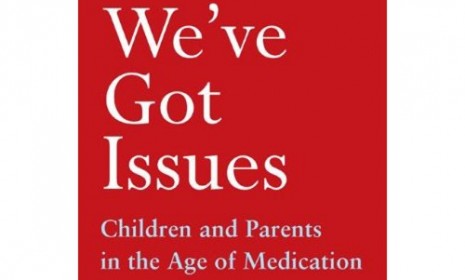Book of the week: We’ve Got Issues: Children and Parents in the Age of Medication by Judith Warner
Judith Warner’s “brilliant” new book is a must-read for anyone who fears that too many children today are being medicated for performance and behavioral issues, said Amy Tuteur in Salon.com.

A free daily email with the biggest news stories of the day – and the best features from TheWeek.com
You are now subscribed
Your newsletter sign-up was successful
(Riverhead, 320 pages, $25.95)
Judith Warner’s “brilliant” new book is a must-read for anyone who fears that too many children today are being medicated for performance and behavioral issues, said Amy Tuteur in Salon.com. Five years ago, she was a skeptic herself, and she began writing We’ve Got Issues with the intention of exposing how greedy pharmaceutical companies and overanxious parents were pushing healthy kids into dangerous pill habits. But then she started actually talking to parents of children with mental illnesses. She discovered that their most fervent wish was not that their offspring get straight A’s but simply that they might be able “to live outside an institution without hurting anyone.” Gradually, Warner changed her mind. Her old position, she now writes, was just prejudice, a blindness to real suffering.
Her new one isn’t much of an improvement, said Alison Gopnik in Slate.com. Did Warner really think she’d find any parents who’d confess that they were knowingly overmedicating their perfectly healthy kids? Only one question about medication really matters: “Do the drugs make the children better?” Warner uses anecdotes to back her argument that they do, but “nowhere in the book does she explain or evaluate the scientific evidence” that could actually answer the question. If she did, she’d find that “the scientific evidence just isn’t clear.” Various psychological syndromes—including autism, ADHD, and dyslexia—are not diseases in a traditional sense. They are clusters of symptoms that become problems only in a society that withholds rewards from those who manifest them. Whenever there’s evidence that other types of intervention can help, we should be “much more conservative than we are” in prescribing psychotropic drugs.
The Week
Escape your echo chamber. Get the facts behind the news, plus analysis from multiple perspectives.

Sign up for The Week's Free Newsletters
From our morning news briefing to a weekly Good News Newsletter, get the best of The Week delivered directly to your inbox.
From our morning news briefing to a weekly Good News Newsletter, get the best of The Week delivered directly to your inbox.
Warner does defend her decision not to probe the science more deeply, said Mary Carmichael in Newsweek.com. Because the science remains murky, she suggests, parents should be considered the best judges of what’s working: After all, why would they keep giving their kids drugs if the drugs didn’t seem to work? Warner’s not completely naïve: She still believes that the greed of pharmaceutical companies needs to be checked. Though she doesn’t settle this debate, she’s added a new voice to it—an impressive accomplishment, considering that the topic was “already one of the most talked-about in all of parenting.”
A free daily email with the biggest news stories of the day – and the best features from TheWeek.com
-
 ‘Those rights don’t exist to protect criminals’
‘Those rights don’t exist to protect criminals’Instant Opinion Opinion, comment and editorials of the day
-
 Key Bangladesh election returns old guard to power
Key Bangladesh election returns old guard to powerSpeed Read The Bangladesh Nationalist Party claimed a decisive victory
-
 Judge blocks Hegseth from punishing Kelly over video
Judge blocks Hegseth from punishing Kelly over videoSpeed Read Defense Secretary Pete Hegseth pushed for the senator to be demoted over a video in which he reminds military officials they should refuse illegal orders
-
Also of interest...in picture books for grown-ups
feature How About Never—Is Never Good for You?; The Undertaking of Lily Chen; Meanwhile, in San Francisco; The Portlandia Activity Book
-
Author of the week: Karen Russell
feature Karen Russell could use a rest.
-
The Double Life of Paul de Man by Evelyn Barish
feature Evelyn Barish “has an amazing tale to tell” about the Belgian-born intellectual who enthralled a generation of students and academic colleagues.
-
Book of the week: Flash Boys: A Wall Street Revolt by Michael Lewis
feature Michael Lewis's description of how high-frequency traders use lightning-fast computers to their advantage is “guaranteed to make blood boil.”
-
Also of interest...in creative rebellion
feature A Man Called Destruction; Rebel Music; American Fun; The Scarlet Sisters
-
Author of the week: Susanna Kaysen
feature For a famous memoirist, Susanna Kaysen is highly ambivalent about sharing details about her life.
-
You Must Remember This: Life and Style in Hollywood’s Golden Age by Robert Wagner
feature Robert Wagner “seems to have known anybody who was anybody in Hollywood.”
-
Book of the week: Astoria: John Jacob Astor and Thomas Jefferson’s Lost Pacific Empire by Peter Stark
feature The tale of Astoria’s rise and fall turns out to be “as exciting as anything in American history.”